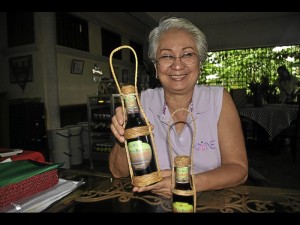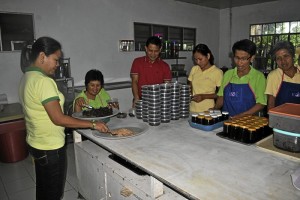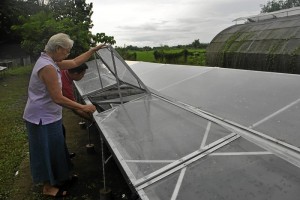In Ecija, wives find ‘back to basics, going natural’ good business

VILMA Joson, president of the Kababaihang Masigla ng Nueva Ecija (KMNE), holds up a bottle of “Vin Arroz” rice wine produced by members of the association. Photo by Anselmo Roque
CABANATUAN CITY—Do you know what really pays in this part of the country?
Going back to basics and going all natural.
A women’s group in Nueva Ecija has been reaping good fortune—and accolades —from homegrown organic food products which it has managed to turn into name-brands. The Kababaihang Masigla ng Nueva Ecija (The Zestful Women of Nueva Ecija) or KMNE operates in Barangay Ilog Baliwag in Quezon town, and is composed of around 30 farmers’ wives and retired teachers.
Their biggest seller is “Vin Arroz,” rice wine with 14-percent alcohol content, which has penetrated the high-end white wine market and which has been a favored gift for overseas Filipinos.
The KMNE label has 30 product lines, including tomatoes sun-dried in olive oil, tomato jelly and tomato sweets, tamarind sweets, concentrated tamarind juice drinks, and guava jelly. The group has turned the local karamay (Tahitian or Othaheite gooseberry fruit) into “Karamoy” candy, which takes its name from the popular champoy or the sweet, salty and sour dried plum popularized by Chinese Filipinos. “Our powdered mushroom is an excellent seasoning. It can be used as worthy substitute for monosodium glutamate,” says Vilma Joson, the KMNE president.

DR. REYNATO Arimbuyutan, Nueva Ecija chapter president of the Philippine Chamber of Commerce and Industry (3rd from left), observes the preparation of food products by members of “Kababaihang Masigla ng Nueva Ecija.” Photo by Anselmo Roque
The group also produces instant salabat (ginger tea) packaged in tea bags and in bottles. It has its own brand of virgin coconut oil and powdered guava, saluyot, tamarind and malunggay.
Because tilapia is readily available, the KMNE is now marketing tilanggit, a salted dried fish similar to Cebu’s danggit.
Joson is the wife of the late Felicisimo Joson Jr., a former labor undersecretary and administrator of the Philippine Overseas Employment Administration (POEA). A fine arts graduate from the University of the Philippines, she engaged for 23 years in exporting garments.
She says she was inspired “to make productive the hours of many of our women in our village.” “They were just playing tong-its (a card game). Sometimes, even the money intended for their children’s food was used for gambling,” she says. Joson encouraged some of the card-players to produce sweets “like what the old folks used to do back then.” She bought their sweets, and then encouraged them to produce more while she coached them about self-respect and the values that would lead them to contribute socially. Her ideas caught fire. Soon the women agreed to form an association and invest their time in the business.
“We showed our products to officials of government and private groups. They said the KMNE had a big potential in the market,” Joson says. First to lend support to the KMNE venture was the Masonic Foundation of Lodge No. 73, which gave the women P150,000 for the purchase of food grade equipment. The provincial government, then run by Gov. Tomas Joson III, followed suit with a P300,000 fund to buy a rice wine plant. Joson’s late husband also donated a 800-square-meter lot, within the family’s compound, where the rice wine plant and the processing facilities for the other products were set up.
The Technical Education and Skills Development Authority (Tesda) gave P50,000 for the group’s initial capital. The Department of Labor and Employment (DOLE) and the Department of Trade and Industry (DTI) gave the women “important pointers as to how to proceed with good manufacturing procedures and development of the products the sanitary way,” Joson says.

A WOMAN checks out a multicommodity solar tunnel dryer developed by the Bureau of Post Harvest Research and Development. Photo by Anselmo Roque
She says keeping the hair secure and maintaining cleanliness in the work place were tips imbibed by the members of the association.
“The multicommodity solar tunnel dryer given us by the Bureau of Post Harvest Research and Extension (BPRE) made our drying of commodities easier and more sanitary. We use this [equipment], instead of drying our produce directly by sunlight,” she says.
Joson became the indefatigable leader in the procurement of the raw materials, in the processing and labeling of the products, and in securing important outlets for the KMNE line. Her house, which stands near the production site, serves as a prime marketing outlet.
“Our mainstay workers get regular pay. When fruits and vegetables are in season, we hire 30 to 50 additional workers,” Joson says.
Schoolchildren get paid on the spot for the fruits used for various products that they turn in. The group always participates in trade fairs. It has 10 marketing outlets in Metro Manila and in some provinces and cities. Recently, the association bagged the Central Luzon Star Elite Award in the micro enterprise industry sponsored by the DTI.
“Our target now is to penetrate the export market,” Joson says.














